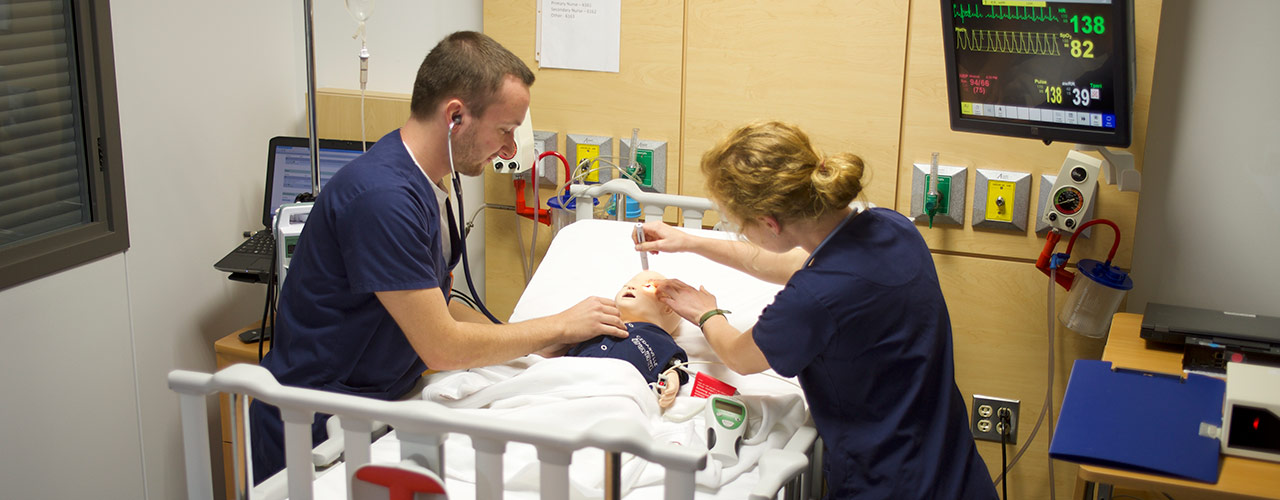by Bryson Durst, Student Public Relations Writer

Health care professionals deal with real-world crises all the time. But before students are ready to face those day-to-day challenges, they need safe ways to practice. Simulations using realistic, interactive mannequins prepare students for crisis scenarios without putting patients at risk.
That’s why Cedarville University offers realistic simulators for its health care programs. The school of nursing recently invested in new Laerdal SimPad Pluses, which are used with moderate-fidelity simulators in the school of nursing teaching and practice labs. This in turn caps off a series of simulator upgrades that will provide immersive educational opportunities for years to come.
The Health Sciences Simulation Center is located on the third floor of the Health Sciences Center (HSC) and includes high-fidelity simulators.
The center’s two Laerdal SimMen mannequins and one Laerdal SimMom are mainly used by upperclassmen in the Bachelor of Science in Nursing program for realistic clinical scenarios.
These mannequins can provide heart sounds, lung sounds, and vital signs such as heart rate and oxygen saturation, and they can sweat, bleed and move. They are controlled by Karen Callan, coordinator of the nursing lab and facilities, who can change the patient’s condition during simulations to respond to treatment.
“It’s all about the students using critical thinking and judgment,” Callan said. “They’re not ready to care for a real patient in crises by themselves. But in the sim center, we can let them care for the patient in a safe and supportive way.”
The simulated scenarios also prepare nursing students to interact with a patient’s loved ones, respond to questions and deal with end-of-life issues. Faculty debrief students after each scenario.
The 16 moderate-fidelity simulators, Laerdal Nursing Annes, are located in the two nursing labs also found on the third floor of the HSC. These mannequins don’t move, but they still produce vital signs and heart and lung sounds. Sophomore nursing students use these mannequins to practice administering IVs, catheters, and medications. They also learn to listen to basic vital signs and to determine whether a reading is normal or abnormal.
“Nursing students get to practice all of their basic skills from the very beginning in these simulations,” said Dr. Angelia Mickle, the school’s dean and an associate professor of nursing.
In recent years, Cedarville has upgraded simulation equipment to ensure continued platform support. Three years ago, the university invested in Laerdal LLEAP software, which provides unified control of all computers operated by Laerdal simulators. Last year, the schools of nursing, allied health, and pharmacy upgraded the Laerdal SimCapture, which provides video and audio recording, annotation, and monitoring capabilities. This will enhance and encourage use of the simulation center for all the healthcare programs on campus in the future.
The most recent upgrades, the SimPad Pluses, replace the SimPads used to run the moderate-fidelity simulators.
Both Callan and Mickle have expressed interest in interprofessional collaboration with the schools of allied health and pharmacy. Already, senior nursing and pharmacy students partner at the start of every spring semester for an Advanced Cardiac Life Support (ACLS) mock code certification opportunity.
In addition to investments from those three schools, the upgrades were made possible thanks to support from Cedarville’s administration, including vice president for academics Dr. Thomas Mach.
“The university saw the importance and significance of us updating the simulation center to invest in keeping it state-of-the-art,” said Mickle. “I’m really grateful for the support of the administration to keep our health care education top rate.”
Located in southwest Ohio, Cedarville University is an accredited, Christ-centered, Baptist institution with an enrollment of 4,715 undergraduate, graduate, and online students in more than 150 areas of study. Founded in 1887, Cedarville is one of the largest private universities in Ohio, recognized nationally for its authentic Christian community, rigorous academic programs, including the Master of Science in Nursing - Nurse Educator program, strong graduation and retention rates, accredited professional and health science offerings, and high student engagement ranking. For more information about the University, visit cedarville.edu.




















